
Plato Journal
Scope & Guideline
Uniting Global Minds in Philosophical Inquiry
Introduction
Aims and Scopes
- Exploration of Platonic Dialogues:
The journal emphasizes the close reading and interpretation of Plato's dialogues, highlighting their philosophical significance and relevance to modern philosophical inquiries. - Interdisciplinary Approaches:
It encourages contributions that integrate insights from various fields such as literature, political theory, and education, reflecting on how Platonic thought intersects with these disciplines. - Ethics and Politics in Plato:
A core focus of the journal is the examination of ethical and political themes within Plato's works, analyzing concepts such as justice, virtue, and the role of the philosopher in society. - Myth and Metaphor in Plato's Philosophy:
The journal explores the use of myth and metaphor in Platonic texts, considering their function in conveying philosophical ideas and engaging with readers. - Pedagogical Applications of Platonic Thought:
The journal also addresses the educational implications of Platonic philosophy, discussing how his ideas can enhance learning and critical inquiry in contemporary educational contexts.
Trending and Emerging
- Re-examination of Emotions in Platonic Philosophy:
There is an increasing interest in exploring emotions within the context of Platonic philosophy, particularly how they relate to concepts of virtue and knowledge, suggesting a deeper engagement with the psychological dimensions of his thought. - Educational Applications of Platonic Ideas:
Recent papers focus on the pedagogical implications of Platonic philosophy, discussing how his dialogues can be utilized to enhance learning and critical thinking in educational settings. - Intersections of Myth and Virtue:
Emerging themes involve the intersection of myth and virtue, emphasizing how Platonic myths serve philosophical purposes and contribute to ethical discussions, reflecting a renewed interest in the narrative aspects of his works. - Political Philosophy and the Role of the Philosopher:
There is a growing trend in analyzing the political dimensions of Platonic thought, particularly regarding the role of the philosopher in governance and societal structures, indicating an ongoing relevance of his ideas to contemporary political discourse. - Innovative Methodologies in Platonic Analysis:
The journal is seeing a rise in innovative methodological approaches to analyzing Platonic texts, including modern philosophical techniques, which reflect an evolving landscape in the study of ancient philosophy.
Declining or Waning
- Historical Contextualization of Plato:
There appears to be a decreasing emphasis on historical contextualization of Plato's works, with fewer papers exploring the historical and cultural background of his philosophy compared to earlier volumes. - Reception Studies in Antiquity:
While earlier issues included more discussions on the reception of Plato in antiquity, recent publications have shifted towards direct engagement with his texts, indicating a waning interest in how his ideas were interpreted by later thinkers. - Comparative Analyses with Other Philosophers:
The trend of comparing Plato's ideas with those of other philosophers, such as Aristotle or later Western thinkers, seems to be diminishing, as more papers focus solely on Platonic thought without external comparisons.
Similar Journals
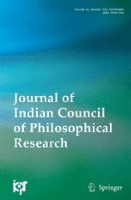
Journal of Indian Council of Philosophical Research
Promoting essential perspectives in philosophical research.The Journal of Indian Council of Philosophical Research, published by SPRINGER INDIA, serves as a vital platform for scholarly discourse in the realm of philosophy. With an ISSN of 0970-7794 and an E-ISSN of 2363-9962, this journal is committed to advancing philosophical inquiry and engaging with contemporary philosophical debates. Although it is currently categorized in the Q4 quartile for Philosophy and retains a position in the 28th percentile within its Scopus category rankings, the journal aims to uplift philosophical dialogue and promote innovative ideas through exclusive articles, reviews, and critical essays. Based in New Delhi, India, the journal operates within a vibrant academic context and spans converged years from 2015 to 2024. While it is not an open-access journal, it offers essential insights and perspectives that contribute significantly to the field of philosophy. Scholars and students alike will find this journal an invaluable resource for enriching their understanding and fostering intellectual growth in philosophical research.

Logos-Anales del Seminario de Metafisica
Empowering Minds with Unrestricted Philosophical KnowledgeLogos-Anales del Seminario de Metafisica is a distinguished academic journal published by Universidad Complutense de Madrid, Servicio Publicaciones, focusing on the dynamic field of philosophy. Since its inception in 1996, this peer-reviewed journal has actively contributed to philosophical discourse, exploring various metaphysical themes and theories. As an Open Access publication since 2017, it provides an invaluable resource for researchers, professionals, and students seeking unrestricted access to cutting-edge philosophical insights. With a current impact factor reflecting its scholarly significance and recognition in the Field, particularly noted in the 2023 Scopus Rankings as ranking 463 out of 806 in Arts and Humanities (Philosophy), the journal remains an essential platform for philosophical exploration and discussion. Located in vibrant Madrid, Spain, Logos serves as a bridge for international scholars to disseminate their work and engage with a broad audience in the field.
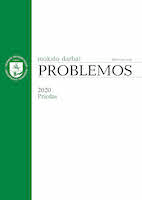
Problemos
Connecting Scholars Through Rich Philosophical DialogueProblemos is an esteemed academic journal published by VILNIUS UNIV PRESS, dedicated to advancing research in the field of Philosophy. With an ISSN of 1392-1126 and E-ISSN 2424-6158, this open-access journal has been disseminating knowledge and fostering scholarly dialogue since 2005. Situated in Lithuania, Problemos has gained recognition, achieving a prestigious Q2 category ranking in the 2023 Philosophy category and a Scopus rank of #458 out of 806, placing it in the 43rd percentile. The journal covers a broad spectrum of philosophical inquiries, making it an essential resource for researchers, professionals, and students seeking to engage with contemporary philosophical discourse. By offering unrestricted access to its content, Problemos promotes the free exchange of ideas and encourages collaboration across disciplines, establishing itself as a pivotal platform within the academic community.

Teoria-Rivista di Filosofia
Cultivating Diverse Perspectives in Philosophical InquiryTeoria-Rivista di Filosofia is a distinguished academic journal published by EDIZIONI ETS, based in Pisa, Italy. With a focus on philosophical discourse, this journal is a valuable resource for researchers, professionals, and students in the field of philosophy. Having achieved a commendable Q3 ranking in the 2023 category quartiles, Teoria stands out in the competitive landscape of philosophy journals, with a Scopus rank of #612 out of 806, placing it in the 24th percentile. Although currently classified as a non-open access publication, it frequently addresses cutting-edge themes and challenges within philosophical research, promoting rigorous analysis and diverse perspectives. The journal spans various topics across multiple issues from its inception in 2011 to its ongoing publications scheduled through 2024, making it a relevant venue for contemporary philosophical inquiry. The journal aims to foster scholarly communication and stimulate critical debates, contributing significantly to the global philosophical landscape.

Convivium
Cultivating a Community of Philosophical DiscourseConvivium is a distinguished open-access journal published by the Universitat de Barcelona, Facultat Filologia, specializing in the field of philosophy. Since its inception, the journal has committed to fostering scholarly dialogue by providing a platform for innovative and critical research. Operating under an open-access model since 2007, Convivium ensures that its articles, which span a range of contemporary philosophical topics, are freely accessible to a global audience, thereby promoting the dissemination of knowledge. Despite facing challenges indicated by its current Scopus rank in the 2nd percentile of the Arts and Humanities, and its Q3 quartile in 2023, Convivium continues to thrive as an important resource for researchers, professionals, and students engaged in philosophical inquiry. With published volumes converging from 2009 to 2014, 2017 to 2018, and 2021 to 2023, the journal is poised to contribute significantly to the ongoing discussions and developments in philosophy.

International Journal of the Platonic Tradition
Fostering Intellectual Engagement in the Platonic TraditionInternational Journal of the Platonic Tradition, published by BRILL, is an essential resource in the field of Philosophy, particularly focusing on the Platonic tradition and its evolution throughout history. Established in 2007, this journal serves as a platform for scholarly dialogue and critical analysis among researchers, professionals, and students exploring the manifold implications of Platonic thought up to the present day. With its ISSN 1872-5082 and E-ISSN 1872-5473, it contributes crucial perspectives within the Arts and Humanities, holding a Q4 ranking in the 2023 category for Philosophy, encompassing an extensive range of topics relevant to contemporary philosophical discourse. The journal currently ranks #580 out of 806 in its Scopus category, reflecting its commitment to advancing academic understanding, while its scope invites contributions that challenge and deepen our comprehension of Platonic influence. This non-open access journal encourages dedicated engagement with its articles, offering insightful research avenues for those who endeavor to unravel the complexities of Platonic traditions.
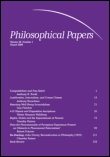
Philosophical Papers
Illuminating the Complexities of ExistencePhilosophical Papers, an esteemed journal published by Routledge Journals, Taylor & Francis Ltd, stands as a pivotal resource in the field of philosophy. Having established its presence since 1972, this journal has converged a wealth of intellectual discourse and contributes to the continuous development of philosophical thought until 2024. With a prestigious Q1 category ranking in the arts and humanities, and a notable 86th percentile ranking in Scopus's philosophy category, it underscores its commitment to rigorous scholarship and influential research. Although Open Access options are not currently available, the journal remains a vital platform for philosophers, researchers, and students aiming to engage with pivotal philosophical debates and advancements. Set in the UK, Philosophical Papers exemplifies the intersection of tradition and innovation in philosophical inquiry, making it an indispensable reference for anyone dedicated to exploring the complexities of human thought and existence.
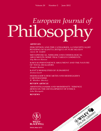
EUROPEAN JOURNAL OF PHILOSOPHY
Elevating scholarship in philosophy to new heights.European Journal of Philosophy, published by Wiley, stands as a premier academic journal in the field of philosophy, recognized for its rigorous scholarship and impactful contributions. With an impressive Q1 ranking in Philosophy as noted in the 2023 category quartiles, the journal places within the top echelons of its field, reflecting its commitment to advancing philosophical discourse. Covering a broad spectrum of philosophical topics, the European Journal of Philosophy features peer-reviewed articles that engage both contemporary discussions and foundational theories, making it an invaluable resource for researchers, professionals, and students alike. The journal's accessibility to readers in the United Kingdom and beyond ensures a wide dissemination of knowledge, fostering an international dialogue that enriches philosophical inquiry. With a convergence of intellectual contributions since 1993, the journal continues to push the boundaries of philosophical thought into 2024 and beyond.
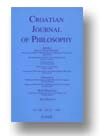
Croatian Journal of Philosophy
Fostering Interdisciplinary Dialogue in PhilosophyCroatian Journal of Philosophy is a distinguished academic platform dedicated to the advancement of philosophical discourse, published by KRUZAK D O O. With an ISSN of 1333-1108 and an E-ISSN of 1847-6139, this journal has been a key player in the field since its inception in 2008, continuing to progress through its converged years until 2024. Recognized for its scholarly contributions, it holds a prestigious placement in Q3 within the philosophy category for 2023 and ranks #571 out of 806 in Scopus, reflecting its engagement with a broad spectrum of scholarly discussions and ideas. Though it operates without an Open Access model, the journal remains a vital resource for researchers, professionals, and students who are keen to explore contemporary and traditional philosophical issues from diverse perspectives. The journal's commitment to expanding the boundaries of philosophical inquiry emphasizes the significance of interdisciplinary dialogue, making it a reputable choice for those seeking to deepen their understanding of philosophical thought.

Phares-Revue Philosophique Etudiante de l Universite Laval
Illuminating the Path of Philosophical InquiryPhares-Revue Philosophique Etudiante de l'Université Laval, ISSN 1496-8533, is a prestigious academic journal published by the Faculty of Philosophy at Université Laval, situated in the heart of Quebec, Canada. This journal serves as a vital platform for emerging scholars in the field of philosophy, showcasing innovative ideas, research findings, and critical discourse. As a crucial resource for researchers, professionals, and students alike, *Phares* encourages the exploration of diverse philosophical topics, promoting intellectual engagement and rigor. Although it currently does not provide open access, the journal's commitment to fostering a rich academic community remains paramount. With its high academic standards, *Phares* stands out as a significant contributor to scholarly dialogue, inspiring ongoing inquiry and discourse within the philosophical realm.